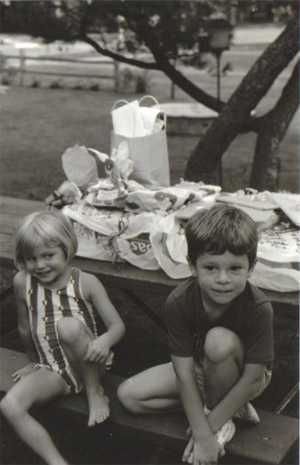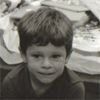Branch Over the River
Matthieu Talpé
Snap. The sandy rocks spread around me, reflecting the bright rays of a summer sun that has warmed them all afternoon. The dusty stables, inviting me to hide in their shade. My hairless legs, bent awkwardly in a diamond shape. My white socks, pulled straight up my calves. My Nike sneakers, whose originally bright colors are faded away by extensive use and whose laces are eternally untied, but remain hole-less. My mom's voice, fainted by the brick walls of the house. The far-away noise of lawnmowers, typical of weekend afternoons. The buzzing of busy bees, the whistling whines of nestlings. The smell of dust and dried dirt, emanating from the minerals and the patch of grass behind me.
Snap. La cour around me is silent, and appears sleepy in the sun. I had come out of the house early, ready to leave, my towel in the car, waiting for my sisters and my mom. I'm excited at the prospect of swimming at my grand-parents' house and the beurre-confitures tartines that follow the hours of diving, splashing, drowning, fighting, and playing in the pool.
Who has never tried to remember a moment, a discussion, or a scene forever?
I am seven years old, only a couple of months away from eight, and I am taking a snapshot of myself, pausing my life to remember this moment, for the sake of remembering. From the scene facing my eyes to the subtlest odors to the faintest twitch of my muscles, I promise to remember each and every one of the current sensations. I am gauging my thoughts, desires, and ambitions, absorbing everything and attempting to compress them in some obscure part of my brain; I have the ambition to remember the scene forever, as an ultimate cognitive post-it. Throughout my life, I will possess the ability to retrieve the picture and examine it, never forgetting what I, as a seven year old, thought, believed, and hoped.
Snap. I examine the length of my legs and attempt to picture these same limbs in several years, as if I am watching a fast-forward video of my legs' growth. I cannot grasp the idea that in the future, I will be the same yet someone else. Fifth grade Matthieu, young adult Matthieu, father Matthieu, what are you like? Do you remember me, seven-year-old Matthieu? Where are you?
Who has never tried to remember a moment, a discussion, or a scene forever? Forever is a vast concept framed in only seven letters, but never fully scaled. Forever, in my situation, means a lifetime, a period of time during which my brain will be constantly solicited and therefore prone to recycle the limited amount of memory. Remembering forever would be something grand, something of extraordinary value, for if unadulterated, the memory would resonate forever as an object of comparison between me at any age and me as a seven year old. In the face of time's stubborn forward progress, unfolding its new surprises without a pause, like an on-going action movie without commercials, there is only one thing one can do to never forget: take a step back.
The one-dimensional attribute of time can be compared to that of a strong river whose current cannot be disturbed, no matter how hard one swims against it. On the journey down the river of life, many have their attention solely directed on the projected path—the future. The past remains mere memories, while the present an utter illusion, an infinitesimally small amount of time, and a simple gateway between the past and the future.
I jump to my feet and sprint to the van, leaving behind the ghost of a seven-year-old boy forever sitting on the shiny rocks in front of the stables.
On that summer afternoon, I managed to grab a branch reaching over the waters. It gave me the opportunity to divert my attention from the current and admire my surroundings, and more specifically, look at the wake behind me, but also my progress down the river. I looked back out of curiosity and looked ahead out of apprehension. That branch was my first step back.
Being a child is easily taken for granted, and yet one day the fastidious world of adulthood suddenly appears, leaving the episode of childhood to memories. How many adults remember with accuracy the years of living in a carefree universe filled with constantly new adventures, colored drawings, and amusing games?
I will never be able to argue that the moment I sat down on the pointy rocks in la cour implicitly defined my entire outlook on the philosophy of life; nonetheless, it first structured a method of thinking that has accompanied me throughout years of childhood, a time where life-long roots are constructed, but yet, mental changes occur rapidly. The value of remaining true to oneself appeared more and more important to me, and easing the noble resolution of never diverging away from my true self was my ability to connect with a seven-year-old Matthieu.
Snap. The sound of my sister opening the front door interrupts my thoughts. I jump to my feet and sprint to the van, leaving behind the ghost of a seven-year-old boy forever sitting on the shiny rocks in front of the stables.
I release my grip on the branch and slowly but surely make my way back to the middle of the river, where the current is the strongest, ready to enjoy the life of a seven year old, with its load of innocent lust and cheerful life.

 Matthieu is a sophomore. What perhaps characterizes him the most are his French roots—he was born and raised, and lived north of Paris until his junior year of high school. Although he is profoundly passionate about any subject that relates to space exploration, he has yet to decide on a specific academic path. Ideally, he would like to study both Course 16 (Aeronautics and Astronautics) and Course 12 (Earth, Atmospheric, and Planetary Sciences), and incorporate some international relations, "ideally" being the key word. He is counting on taking Unified this upcoming year to help him decide. His freshman year three: varsity soccer, Phi Sig, the Boston marathon.
Matthieu is a sophomore. What perhaps characterizes him the most are his French roots—he was born and raised, and lived north of Paris until his junior year of high school. Although he is profoundly passionate about any subject that relates to space exploration, he has yet to decide on a specific academic path. Ideally, he would like to study both Course 16 (Aeronautics and Astronautics) and Course 12 (Earth, Atmospheric, and Planetary Sciences), and incorporate some international relations, "ideally" being the key word. He is counting on taking Unified this upcoming year to help him decide. His freshman year three: varsity soccer, Phi Sig, the Boston marathon.